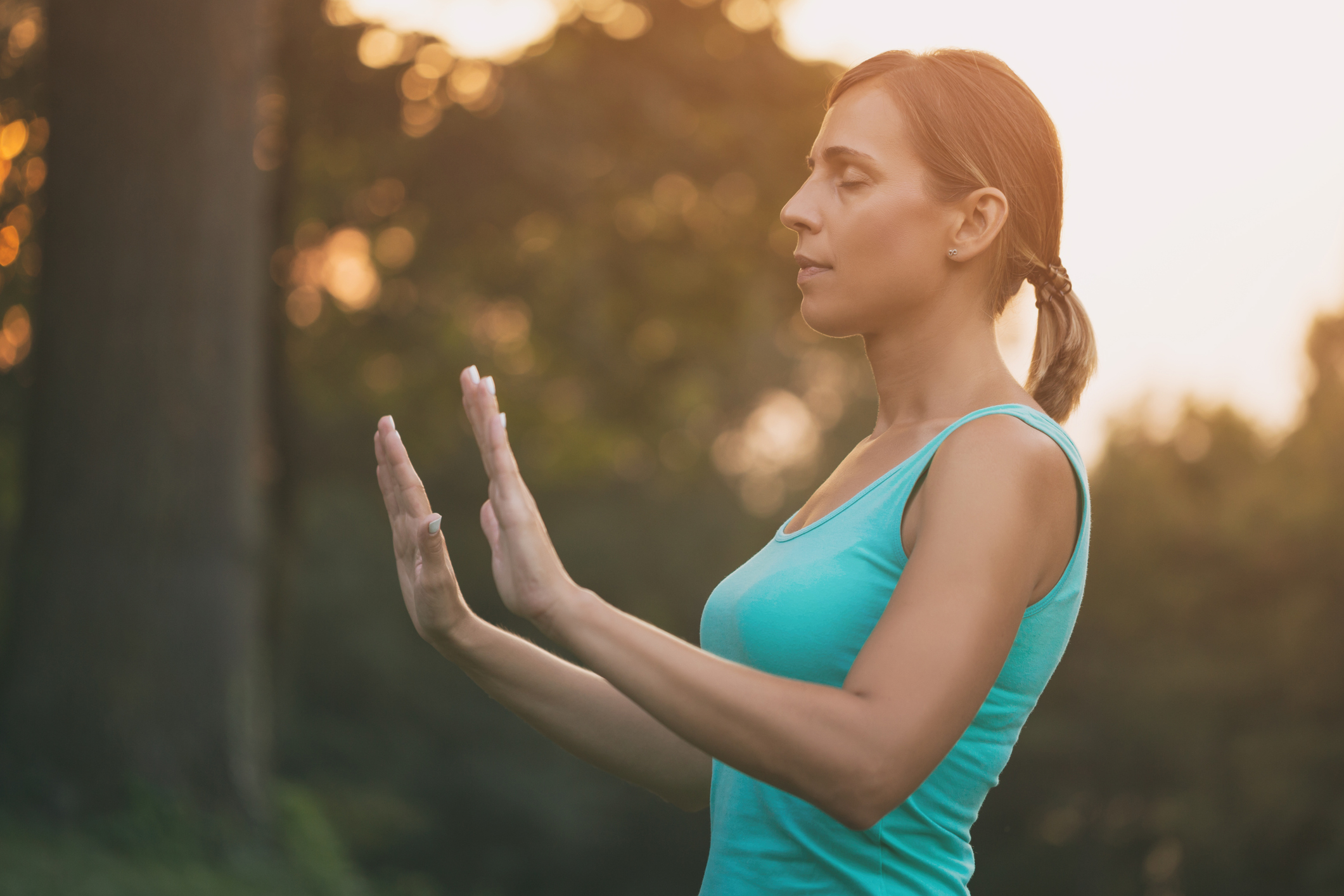Get Easy Health Digest™ in your inbox and don’t miss a thing when you subscribe today. Plus, get the free bonus report, Mother Nature’s Tips, Tricks and Remedies for Cholesterol, Blood Pressure & Blood Sugar as my way of saying welcome to the community!
7+ reasons tai chi is the movement your body needs

I remember the first time I came across a group of people in a park practicing tai chi.
The slow and graceful movements were beautiful to watch. But it was the mindful concentration and peaceful expressions on the faces of those participating that really pulled me in.
I remember yearning for that kind of community and connection. I found it in my love for choir, but I’ve had tai chi in the back of my mind ever since.
And with evidence-based benefits like these, why not give it a try…
What is tai chi?
“One of the biggest advantages of tai chi from a health perspective is that anyone can practice it, which includes those who have health issues, injuries, or limited mobility,” says Andrea Felix, a Certified Expert Instructor who has been practicing tai chi since 2006.
Tai chi is a practice that involves a series of slow, gentle movements and physical postures, a meditative state of mind, and controlled breathing. Although it originated as an ancient martial art in China, it has become known for promoting physical and mental well-being.
What the research says about tai chi
Dr. Peter Wayne, author of The Harvard Medical School Guide to Tai Chi, maps out eight characteristics that are central to tai chi practice:
- Awareness
- Intention
- Structural integration
- Active relaxation
- Strengthening and flexibility
- Natural, freer breathing
- Social support
- Embodied spirituality
In 2024 alone, many studies have confirmed Dr. Wayne’s belief that these factors work together to deliver the following physical and mental health benefits:
Balance. Did you know that poor balance is a sure sign of a shorter life?Three studies have confirmed the fact that tai chi improves balance. One of these was a meta-analysis of 17 randomized clinical trials.
Low back pain. An analysis of ten randomized controlled trials found that the practice of tai chi helps relieve chronic low back pain. Maybe that’s why the American College of Physicians, who suggest drugs should be a last resort for back pain, includes Tai Chi in their top 3 recommendations to relieve this common complaint.
Blood pressure. A randomized clinical trial found that tai chi was more effective than aerobic exercise in reducing blood pressure.
Parkinson’s disease. A 3.5-year cohort study showed that tai chi helped ease both motor and non-motor symptoms in patients with Parkinson’s, with these benefits lasting several years.
Sleep. Another study found that tai chi improved cognition and sleep. It also suppressed inflammation and enhanced metabolism.
Another study of breast cancer survivors with insomnia found that tai chi not only helped the insomnia, but also reduced markers of inflammation, thus making a relapse less likely.
Mental health. A review of 20 studies concluded that tai chi helps reduce symptoms of anxiety and depression in older adults and improves their social connections.
Finally, tai chi has been shown to increase functional connectivity in the brain, which may help prevent age-related decline.
How to get started with tai chi
Tai chi is a meditative exercise that combines deep breathing with slow, focused movements. It’s perfect for those with limited mobility who need to increase their activity level gradually.
The quickest way to get started is by watching a video like this one. Or this one.
But taking a tai chi class at your local senior or community center will connect you with others who are trying to learn. The socialization that comes along with this is an added bonus!
Editor’s note: Did you know that when you take your body from acid to alkaline you can boost your energy, lose weight, soothe digestion, avoid illness and achieve wellness? Click here to discover The Alkaline Secret to Ultimate Vitality and revive your life today!
Sources:
A Growing Amount of New Research Confirms the Many and Diverse Health Benefits of Tai Chi — Integrative Practitioner
Tai Chi: What You Need To Know — National Center for Complementary and Integrative Health
The effects of different types of Tai Chi exercise on anxiety and depression in older adults: a systematic review and network meta-analysis — Frontiers in Public Health
Effect of Tai Chi vs Aerobic Exercise on Blood Pressure in Patients With Prehypertension: A Randomized Clinical Trial — JAMA Network Open
Effect of long-term Tai Chi training on Parkinson’s disease: a 3.5-year follow-up cohort study — Journal of Neurology, Neurosurgery and Psychiatry















